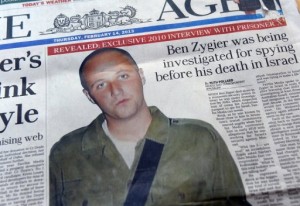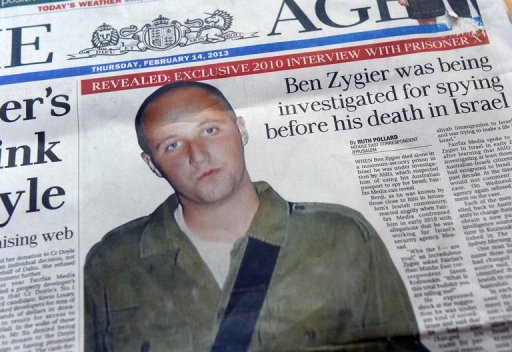
(AFP) — The mysterious arrest and suicide of an Australian-Israeli with Mossad ties in a top-secret prison cell near Tel Aviv has raised questions about how Israel’s shadowy spy outfit chooses its agents.
While some reports suggested the man now identified as Ben Zygier may have been a loose-lipped braggart with psychological problems, a veteran Israeli defence analyst dismissed the claims, saying it would have shown up clearly in the agency’s exhaustive vetting procedures.
Australia’s ABC which broke the story of his identity last week, said Zygier had worked for Mossad until he was arrested in early 2010 for reasons which remain a mystery, and was thrown into an isolated high-security cell in Ayalon prison where he was found hanged 10 months later.
Although Israel confirmed the death of a dual national in prison in December 2010, it has refused to comment on his involvement with Mossad nor said anything about why he was arrested, key details which remain subject to a court-ordered blackout in the name of national security.
But last week, a human rights lawyer who met Zygier just days before he died, confirmed his contact at the prison was a Mossad agent.
And on Sunday, Prime Minister Benjamin Netanyahu warned that exposing intelligence activities could “badly damage” state security in what appeared to be the closest admission yet of the prisoner’s links to Mossad.
Australian journalist Jason Koutsoukis, who interviewed Zygier several times in early 2010, said the Melbourne-raised lawyer had vehemently denied spying.
But a friend who knew Zygier from his days living on a kibbutz told Haaretz newspaper the young Australian had “bragged about his work for the Mossad.”
Another friend quoted by the paper said Zygier told him about a traumatic experience providing security backup for Israeli intelligence operatives in Lebanon.
“Ben … told me that he had been compelled to kill a boy and girl while providing security for an operation in Lebanon. He told me he was hospitalised for a month with shell shock,” he said.
“It astounds me if that could really happen. If so, how did they recruit him into the Mossad?” he wondered.
“Israel does not recruit someone who says he’s in Mossad. If someone says he’s Mossad, he’d be fired,” said another Israeli friend who knew the Zygier family.
Intelligence and defence expert Yossi Melman told AFP that any flaws in Zygier’s character would almost certainly have been known to his employers.
“The vetting is very, very, very rigorous,” he said.
“It can take a year before someone is recruited, just to begin as a cadet. You undergo psychological screening and psychometric exams and you talk to psychologists, you are interviewed, then you are given some sort of tests in the field,” he said.
“If (Zygier) had any past problems … I am sure that Mossad knew about it,” said Melman, whose book “Spies Against Armageddon” looks at Mossad operations targeting Iranian nuclear scientists.
According to the latest report by ABC published on Monday, Zygier was arrested by his Mossad handlers after leaking detailed information about his work to the Australian intelligence services.
It said Zygier had given the Australians a comprehensive account of a number of Mossad operations, including plans for a top-secret mission in Italy that had been years in the making.
Zygier, who also went by several other surnames — Alon, Allen and Burrowes — was reportedly one of three Australian Jews working for Mossad who changed their names several times to take out new passports, enabling them to travel to Middle Eastern countries where Israelis cannot enter.
It said he was involved in setting up a Europe-based communications company for Mossad that exported electronic components to Iran and to other Arab countries, working alongside two other Australian-Israelis also employed by the spy agency.
But the alarms went off at Mossad after it uncovered his contact with the Australian spy agency, ASIO, ABC said.
Zygier’s sudden arrest in February 2010 took place shortly after Dubai police accused Mossad of being behind a January hit on a top Hamas militant and said it was seeking more than a dozen suspects with Western passports — four of them Australian.
“Whatever he did, he did something that compromised the organisation and compromised maybe some field operation, maybe he even compromised some field agents, I don’t know,” Melman said, basing his assessment on information published abroad.
To his understanding, Zygier would only have been a relatively minor cog in the Israeli intelligence machine.
“He didn’t have a serious job, that’s clear for me,” he said.
“I think he served for a couple of years.”
